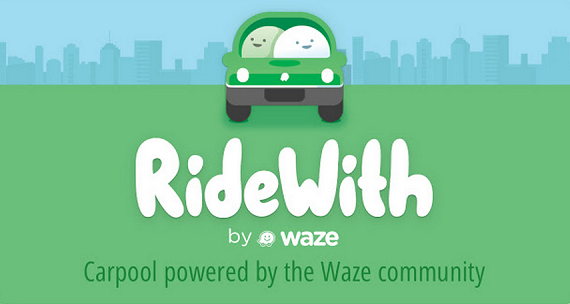Perseverance: From running out of money to an IPO - StubHub comes back strong
In the post-Covid drive for live events, ticket platforms are jumping at the opportune market time
Read more...
Are there any more unlikely competitors than Google and Uber? Given how different their respective companies, I'm not sure I could have predicted that the two would find more than one way to encroach on the other's space. Yet, here we are, with Google potentially getting into the e-hailing business.
Waze, the Google-owned online mapping company, is set to launch its own carpooling service this week in Israel, the company has revealed in a blog post.
Called RideWith, the pilot for the app, which should be available on Android this week, with an iPhone app scheduled for later one, will be limited to the Gush Dan area, which includes Tel Aviv.
To be clear: as of right now RideWith would not be a direct competitor to Uber, as there are certain restrictions being put on it, most likely to keep it clear of the regulatory hurdles that Uber has faced, including having to suspend certain services in France last week following riots and arrests.
For example, the new service seems to focus on getting people and from work, as the number of trips drivers are able to make is limited to two a day, and only from their home neighborhoods to their workplaces, according to an FAQ Waze has put up about the service.
Drivers are also not allowed to turn driving into a business. Instead, their passengers help "pitch-in on the cost of gas and wear and tear on a vehicle by reimbursing the driver via the app when the ride is complete."
RideWith calculates the cost of gas and depreciation based on route mileage and suggests an amount. The driver have the ability then accept or decline the ride and rate. With just two rides a day, though, these drivers won't be displacing taxi cabs in these areas anytime soon.
"Carpooling can help reduce travel and fuel costs, the number of cars on the road, strain on the environment and parking stress. Plus, time flies when you have someone to talk to! Yet carpooling can be a hassle and difficult to manage," Waze wrote.
"With deep local traffic insight and a large, passionate community, Waze has developed RideWith to serve Israeli commuters at their greatest time of need: rush hour. We hope to learn a lot from this pilot and will let you know how it goes."
Google purchased Waze in June of last year for $966 million. The company, which was founded in 2007 in Israel, is a navigation app with a crowd-sourcing twist: it encourages drivers to get into their cars and share driving conditions and experiences with other members of the online community. In return, Waze provides real-time information on the circulation and short-cuts, while making suggestions for stops along the way.
Companies like Uber and Lyft have also experimented with carpooling, but that has translated into fare-splitting features, allowing people to reduce their fares by finding others going in the same direction.
While RideWith is currently avoiding being an Uber competitor, and all the headaches that come with that, it is not hard to see it, one day down the road, deciding to enter the e-hailing space as well.
It's another wrinkle in the always interesting, and always evolving, relationship between Google and Uber.
Google has supported Uber in the past. Google Ventures, the company's venture capital arm, invested $258 million in Uber in August 2013 and has been a big advocate for the ride-share startup.
The two companies, though, are becoming rivals in another area, as they are seemingly going to go head-to-head over the driverless car, with Google having worked on the idea for years, and recent reports indicating that it is now looking to turn them into a fleet of taxis.
Uber, meanwhile, is working on its own self-driving vehicles. The company entered into a strategic partnership with Carnegie Mellon University to create the Uber Advanced Technologies Center, through which it will work on developing that technology.
At the same time, Uber has, for a long time, relied on GoogleMaps for its driver navigation system. Lately, though, Uber has been taking steps to get away from Google by developing its own mapping system, purchasing deCarta, a mapping and search company, in March, followed by the acquisition of tech and talent from Microsoft Bing's map unit last week.
If, and when, Google does decide it wants to use Waze to launch a full scale e-hailing service, possibly using its fleet of driverless cars, that is when this budding rivarly will become really interesting.
This news was first reported by Haaretz on Monday.
(Image source: blog.waze.com)
In the post-Covid drive for live events, ticket platforms are jumping at the opportune market time
Read more...EveryCure will leverage BioLogicAI, BioPhy’s predictive AI engine, to assess drug-disease matches
Read more...The contract will make it easier for state agencies to evaluate and implement Fusion's technology
Read more...Startup/Business
Joined Vator on
Uber is a ridesharing service headquartered in San Francisco, United States, which operates in multiple international cities. The company uses a smartphone application to arrange rides between riders and drivers.


